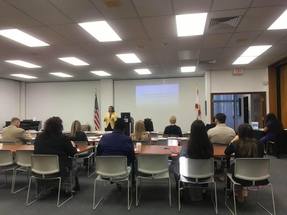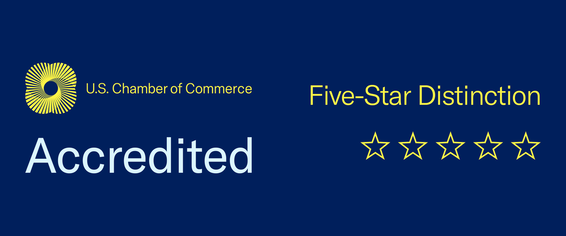 Last Thursday Chamber members heard from Amanda Walls, from Peterson & Myers, about Human Resources Best Practices. This breakfast was presented by Central Florida SCORE, a non-profit business mentoring program that travels around Polk County with experienced professionals, like Amanda Walls, to share ideas and practices for professionalism, business development and more. Although this was one of their last sessions of the season, they plan to start back up in the Fall season of 2018. There are many things that can be covered underneath the umbrella of Human Resources. Whether you are dealing with the compensation of employees or knowing what employment laws apply to your business in each season, it can be hard to get a clear grasp on this topic. Amanda Walls was able to dive deeper into the practical and legal side of human resources, as well as give tips and helpful hints to business owners who want to have best practices.
Firstly, Amanda went over the questions, "To hire or not to hire?" When it comes to small businesses, employers struggle with this question. They want their business to grow, but they don't want the hassle of hiring someone and creating more work for themselves. Trying to avoid hiring full-time or part-time employees, small business owners will attempt to hire Independent contractors. Amanda emphasized the importance of looking very carefully at any Independent contractor that you might hire. Not only should you make sure that they have a legitimate, licensed if necessary, business, you should also make sure to have a written agreement with them. Many people make the mistake of skipping documentation, but Amanda said that it is the very first thing you need to establish in a situation of hiring an Independent Contractor. In the case that a business does hire an employee, according to the FLSA, "all employees are eligible for time and a half overtime compensation for hours worked in excess of 40 in one work week, unless their job qualified as one of the "white collar" exemptions to the general overtime rule." When businesses create a job description, they should always indicate whether or not it is categorized as exempt or non-exempt from the FLSA requirements. There are 4 different categories underneath the "White Collar Exemptions." The first is the Executive Exemption, which would be for someone in a managerial position or an executive position. These employees have the authority to hire and fire someone. Next is the Professional Exemption. This exemption is for someone whose profession is one that is learned or creative. This employee must have duties that include invention, imagination or talent in recognized fields of art or creativity. Administrative Exemption is the the third exemption. To qualify for this particular exemption, the employee must perform non-manual work that is directly related to the operations of the business they work for. The last exemption is the Computer Employee Exemption. This employee must truly work as a computer analyst, software engineer or something of this nature. They should be skilled in this field and performing specific duties for the exemption. Amanda also went over the specifics of determining what is work time and what isn't. Many people struggle with paid mileage, out of town conferences and things like that. But Amanda helped clear the air for many people who had trouble making that distinction. If a business is requiring an employee to go on a business trip, training or meeting, the employer must compensate that person because the business is making it a requirement. Another issue guests brought up was the drive from home to work and if that is required to be compensated. Amanda shared that this is not means to compensate and businesses who compensate for other mileage are not required to do so. It is more like a gift from the business to their employees. As businesses grow, Amanda shared that they should have certain laws and regulations in their mind. Things like Title VII of the Civil Rights Act of 1964, Pregnancy Discrimination Act, Genetic Information Non-Discrimination Act, Americans with Disabilities Act and Age Discrimination in Employment Act. Knowing the details from these acts will help employers avoid law suits and difficulties with future employees. Amanda was also able to answer many questions from the crowd regarding their businesses, growth and certain issues that they have been facing with their employees. She was able to enlighten many people and shed some light on some controversial issues within the Human Resource world.
0 Comments
Your comment will be posted after it is approved.
Leave a Reply. |
Upcoming Events |
|


